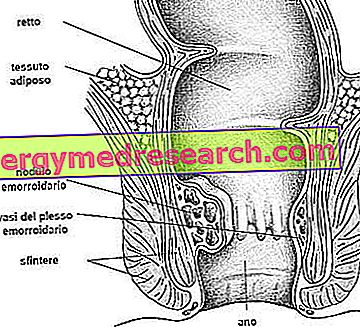Generality
Nervous exhaustion, or neurasthenia, is a mental state that determines a certain emotional turmoil and a particular fatigue of a psycho-physical nature.
Generally, it is an acute condition, which has a temporary duration and sudden onset.

The most common symptoms of a nervous breakdown are: anxiety, worry, depressive disorders, little interest in the pleasures of life and emotional fragility.
The main treatment reserved for those suffering from nervous exhaustion is psychotherapy.
The use of drugs depends, in part, on the symptoms and, in part, on any conditions associated with neurasthenia.
What is nervous breakdown?
Nervous exhaustion, or neurasthenia, is a mental state that involves an emotional turmoil associated with a dual nature, physical and psychological fatigue.
People with a nervous breakdown are subjects who are down in the dumps, tried to the point of being emotional and even physically tired.
In general, nervous exhaustion is a temporary, acute and sudden onset condition.
Curiosity: meaning of neurasthenia
The word neurasthenia means "nervous fatigue"
IS THERE A MEDICAL DEFINITION?
No medical text that treats mental illnesses and their diagnostic criteria (including the well-known DSM, or Diagnostic and Statistical Manual of Mental Disorders) defines or speaks of nervous exhaustion. This is due to the fact that the medical-scientific community does not consider neurasthenia a real disorder of the mind.
The experts who wanted to give a scientific name to nervous exhaustion refer to the latter with the terminology of " mental health crisis ".
Causes
The main cause of nervous exhaustion is the stress that different life situations can cause.
According to some statistical research, the main circumstances that - due to the stress they induce - are at the origin of most cases of nervous exhaustion are:
- The problems of intimate relationship . According to a 1996 US study, divorces and separations accounted for 24% of the cases of nervous exhaustion considered.
- Problems in the workplace or at school . According to the same previous study, these issues were responsible for 17% of the cases of nervous exhaustion considered.
- Financial problems . Again, according to the same 1996 study, this type of problem was at the origin of 11% of the cases of neurasthenia considered.
- Family problems . These include, for example, the separation and divorce of parents.
- Health problems . Curiously, some research has shown that, over the decades, the influence of these problems on the appearance of nervous exhaustion has been reduced (in 1957 they were the cause of 28% of cases, while in 1996 only 5.6% of cases ).
- Being the victim of an abusive relationship .
- The death of a dear member of the family or a very close friend .
- Try repeated anxiety attacks or have ongoing concerns.
- Suffering from the so-called obsessive compulsive disorder (DOC), associated with anxiety.
- The succession of a physical trauma to a certain anatomical area of the body.
- Being involved in a serious natural disaster .
- Suffer from depression or similar ailments.
STUDIES ON THE BRAIN
Several researchers have studied the brains of people with nervous exhaustion, to understand what happens to you or if something happens to you.
Curiously, part of the studies carried out reported that, in the brain of some patients, there was an imbalance of neurotransmitters .
Neurotransmitters are chemicals that allow cells in the nervous system, so-called neurons, to communicate with each other.
The discovery of an imbalance of neurotransmitters only in some patients is not sufficient to give a biological explanation for nervous exhaustion. Therefore, more scientific studies and more detailed investigations are needed.
SIMILARITY WITH THE PANIC ATTACK
Nervous breakdown resembles a panic attack from various points of view, including stress as a causative agent.
Other elements in common between nervous exhaustion and panic attack are: the sudden appearance and the temporary nature of symptomatic manifestations.
Note: a panic attack is an episode of discomfort, anxiety or fear, which occurs suddenly and is temporary.
Symptoms and complications
To learn more: Symptoms Exhaustion Nervous
The characteristic symptoms of nervous exhaustion are sensations, which can more or less markedly affect the quality of life of patients.
Specifically, following a nervous breakdown, an individual can develop:
- Sense of anxiety, worry or fear towards something indecipherable.
- Typical disorders of depression (depressive disorders) and a negative mental attitude towards life and the events that characterize it (recurrent pessimism, mistrust, etc.).
- Sense of little interest in what you usually like.
- Sense of loss outside your home. This translates into the tendency to remain confined at home and to avoid contact with the outside world.
- Emotional fragility. This leads to a certain ease in crying and sadness.
- Passivity in the face of events and a sense of lack of mastery of one's life.
- Strong insecurity.
- Physical fragility and ease of fatigue, even after minimal efforts.
- Night sleep disorders.
- Confusion of thought.
- Disinterest in personal care.

CONSEQUENCES OF ANXIETY
The sense of anxiety has several consequences: it determines, for example, an increase in blood pressure, dizziness, dizziness, tremors, a feeling of sickness or pain in the stomach etc.
CONSEQUENCE OF DEPRESSIVE DISORDERS
The consequences of depressive disorders that can arise from a nervous breakdown usually consist of: weight gain or loss, social isolation, lack of interest in family relationships, lack of interest in working life and suicidal thoughts.
CONDITIONS ASSOCIATED WITH NERVOUS EXHAUST
In some situations, the nervous breakdown is dependent on the presence of real mental illnesses, which it would be good to identify and treat in a specific manner.
The mental illnesses associated with nervous exhaustion include:
- Bipolar disorder
- Schizophrenia
- Acute stress disorder
- Post-traumatic stress disorder
- Acute depression. It is important to emphasize that there is a certain difference between suffering from depression and manifesting the typical disorders of depression. The first situation is decidedly more serious and more difficult to treat than the second.
- Borderline personality disorder
Diagnosis
For a correct diagnosis of nervous exhaustion, the following are essential: a thorough physical examination, a careful medical history, some laboratory tests (for example blood tests, etc.) and a psychological evaluation.
Note: laboratory tests are used to rule out that the symptoms are due to some biological problem.
IMPORTANCE OF PSYCHOLOGICAL ASSESSMENT
First of all, the psychological evaluation makes it possible to establish whether the symptoms, which the patient complains of, are really attributable to a nervous breakdown.
Then, it allows us to outline the characteristics of neurasthenia, to trace its causes and to identify any associated mental illnesses.
Understanding the characteristics, causes and possible disorders associated with a nervous breakdown is important for therapy planning.
Treatment
The main treatment reserved for those suffering from nervous exhaustion is psychotherapy (or psychological therapy). The latter offers the patient the opportunity to talk to the therapist about his / her problems and difficulties: dialogue with an expert helps to identify the causes of psycho-physical fatigue and find a possible remedy, including a preventive one.
Psychotherapy is a term of wide meaning and includes various techniques (or modalities) of psychological treatment. Among these techniques, the most practiced in case of nervous exhaustion are: psychoanalysis, cognitive-behavioral therapy, psychodynamic psychotherapy and expressive therapy .
Alongside psychotherapy, pharmacological treatment also plays a role of non-negligible importance.
The choice of the most suitable drugs depends on the characteristics of nervous exhaustion:
- A nervous breakdown involving anxiety or worry may require the use of anxiolytics .
- A nervous breakdown that leads to depressive disorders or is associated with acute depression leads the medical therapist to prescribe antidepressants .
- A nervous breakdown associated with schizophrenia may require the administration of antipsychotics .
- A nervous breakdown associated with bipolar disorder can motivate the prescription of mood stabilizers .
ALTERNATIVE REMEDIES
They can promote relaxation, thanks to their anti-stress effect, and help in the prevention of future nervous exhaustions remedies that are not really medical like: yoga, aromatherapy, progressive muscle relaxation and hypnosis.
AN IMPORTANT COUNCIL
Experts strongly advise against trying to overcome a nervous breakdown without any outside help. In fact, the support of a skilled therapist is, in many cases, fundamental.
Furthermore, according to the experts, it is very important for a person suffering from nervous exhaustion to talk with family and friends.



